Oui or non? French views on Brexit


But as millions of Britons debate the Brexit question, what’s the view across the Channel of our big decision?
The French - whose President Charles De Gaulle famously said ‘non!’ to our original attempts to enter the European Community - are watching the arguments with interest.
Advertisement
Hide AdAdvertisement
Hide AdRaphaëlle Pérez, a student at the Journalism School at University of Strasbourg who has been gaining work experience with portsmouth.co.uk, spoke to people in the French city about their views.
Kevin Batista, a student at CUEJ (Journalism School at University of Strasbourg)
‘I used to be in favour of the UK’s presence in the EU, but I changed my mind after I spent a year in Newcastle on an Erasmus exchange programme.
The two countries have different ambitions, and it’s preferable to go ahead without them, rather than having the UK dragging their feet. But no panic: Europe and the UK will remain partners, and it won’t be an iron curtain. There are already border controls before and after entering the UK.
Advertisement
Hide AdAdvertisement
Hide AdThe UK is taking part in the talks on euro even though they have the pound. In England, the absence of the EU flag when the British flag is displayed everywhere in Europe is evidence of their limited interest in the EU. In contrast, in France, both flags are often displayed side by side. And the UK is often reluctant to European projects, so why not?
We will still do business with them. But they already have the Commonwealth, and they are less dependent than we are. France wants a diplomatic, political, and supportive Europe. The UK sees the EU more like an association. They don’t get involved any longer, and keeping them would be a waste of time and money.’
Anne-Camille Beckelynk, a journalist for the daily Les Dernières Nouvelles d’Alsace who works on European concerns
‘It is difficult to believe in David Cameron’s sincerity. Since he has been in power, he has considered the possibility of a UK withdrawal from the European Union. And he has more than once considered withdrawing from the European Court of Human Rights.
Advertisement
Hide AdAdvertisement
Hide AdHis policy is “Hold me back, or I am going to do someone some damage” (in reference to a 1984 French film). Discussions of exiting the EU date back as far as Margaret Thatcher’s period. But Cameron will bear full responsibility for the decision. Asking British people whether the UK should remain in, or exit the EU will make him responsible and keep his name attached to an unprecedented decision in history.
Two or three years ago, withdrawing without a catastrophe was possible. Today, in either case, we will be in an uncomfortable position. We have accepted blackmails and small arrangements, and we are stuck whatever happens. But no one is ready to beg them to stay in that marriage where the bride is constantly considering a change of mind. No one told them “stay”, except Brussels. We may wonder if the deconstruction of Europe will take place with the UK inside, or outside the EU.’
Arthur Lindon, a student at CUEJ
‘The United Kingdom entered the EU in 1973, after two applications vetoed by the then president of France, Charles de Gaulle. When they did, they accepted common rules which then evolved. The proponents of Brexit cannot accept that the UK has lost its sovereignty in many areas in which the European Union has competencies. But why should we suffer the United Kingdom’s bad will?
Leaving now would be an admission of weakness regarding the EU, a sign a treason towards the other member states, and evidence of its incapacity to create a consensus vital to its proper functioning. The UK can already consider itself lucky. It should take responsibility for its political decisions. In case of disagreements, the door remains open for any state to leave. Besides, France and the UK are partner states. A withdrawal would freeze diplomatic relations between the two countries. Taxes would rise, and French export to the UK would decline. These changes would spread to other countries in the EU, and might lead to the loss of the common market”.’
Hervé Moritz, editor in chief of Le Taurillon
Advertisement
Hide AdAdvertisement
Hide Ad‘I am in favour of the UK remaining in the European Union. But the debate is not easy for pro-Europeans. Some federalists support the UK exiting the EU. English people are more Eurosceptic than in France. There will be a division in Scotland if English people vote in favour of Brexit. The UK’s special status is blocking the advance of the European Union and holding up any progress. One cannot play this game, Europe “à la carte”. The process will take a long time. The referendum is in June, but if it was to be, Brexit would not be effective before two or three years.
Eurosceptics and their speeches have much influence on the media. But pro-European circles are waking up. The stakes are too important for the UK to exit the European Union, according to opinion polls and the latest general elections. For economic reasons, the City of London will not be in favour of Brexit. Nor will the academic community, which is well aware of European concerns.
David Cameron’s strategy is sheer bargaining. He is against Brexit, but has negotiated an EU reform deal to have more advantages. The question is not: “Would you prefer the UK in or outside Europe?” but more like “Do you prefer the UK out, or agree with David Cameron’s requests?” This leaves the door open to other European countries’ haggling.’